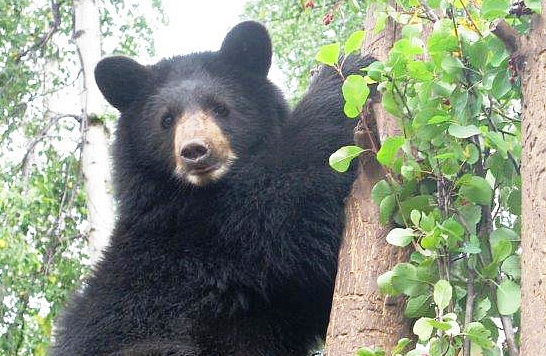Langley RCMP say over the long weekend they received a report of a cougar sighting in Williams Park, and also a bear sighting in North Langley.

To help residents safe they have released some tips and information about the wildlife found in the area.
Coyotes will often eat pet food stored outdoors, accessible garbage or compost or even fallen tree fruit. If you see a coyote conservation officers say it is important to appear as aggressive as possible. Shout in a loud deep voice while moving towards an area where there is more activity. Do not run, and maintain eye contact, or even throw something at the coyote to scare it away.
Coyote sightings can be reported to Stanley Park Ecology Society through their website at www.stanleyparkecology.ca or by calling 604-681-WILD (9453). Report aggressive coyotes or the feeding of coyotes to the Ministry of Water, Land and Air Protection at 1-800-663-9453.
Coyotes are very adaptable creatures and are commonly found in cities across North America. Some other interesting facts about them from the Langley RCMP:
- Coyotes have large ears that point up. They can hear a mouse under 20 cm of snow.
- Coyotes rarely fight with each other. They use gestures and sounds to communicate.
- The majority of coyotes that have bitten children have been fed by adults.
- Coyotes have bushy black tipped tails which they carry low while in motion.
- Coyotes are active day and night.
- Coyotes eat a wide range of foods including rodents, fruit, insects and fish.
- Lower Mainland coyotes weight between 20 to 35 lbs.
Police recommend to avoid conflict with coyotes:
- ‘Got to be even-keel’: Canucks coach lays out playoff Game 3 priorities
- Instant ‘karma’ for faceplanting thief who stole Nanaimo business’ sign
- ‘We have a history’: Vancouver mayor explains why no Canucks outdoor party
- Affordable rental development underway in Vancouver’s Little Mountain neighbourhood
- Keep pets indoors or in secure kennels at night for safety
- Bring farm animals into enclosed sheds or barns at night, especially during calving or lambing seasons.
- Do not leave pet food or food scraps outside.
- When children are playing outdoors, closely supervise them.
- Light walkways around your home and remove any heavy vegetation or landscaping near the house.
- Avoid feeding or attracting deer.
- Hike in small groups and make enough noise to prevent surprising a cougar.
- Keep small children close to the group, preferably in plain sight just ahead of you.
A cougar has also been sighted in Port Moody, trying to snatch a small dog, and police want to warn residents what they should do if they see a cougar:
- Stop, stand tall and don’t run. Pick up small children. Remember, a cougar’s instinct is to chase.
- Face the cougar, talk to it firmly, always leaving the animal an escape route.
- Try to appear larger than the cougar by getting about it. (ie. Steeping up onto a stump) If you are wearing a jacket, hold it open to further increase your size.
- Do not take your eyes off the animal or turn your back. Do not crouch down or try to hide.
- Be assertive. Shout, wave your arms and throw rocks. They idea is to convince the cougar you are not prey, but a potential danger.
- If the cougar attacks, fight back aggressively and try to stay on your feet. Cougars have been driven away by people who have fought back using anything within reach, including sticks, rocks, shovels, backpacks, and clothing – even bare hands. Generally, if you are aggressive enough, a cougar will flee, realizing it has made a mistake.
Report ALL sightings of cougars to the Conservation Officer Service call centre at 1-877-952-7277.
Bear sightings are also common in B.C., and police have provided some tips for residents at this time of year:
- A bear that does not find food will move on.
- It is an offence under the Wildlife Act to feed dangerous wildlife.
- Keep away from the bear and tell others to do the same.
- Bring children and pets inside until the bear has left.
- If you do meet a bear, try to remain calm. Do NOT make eye contact.
- Never approach or chase the bear, instead face the bear without making eye contact and back away slowly.
- Extend your arms above your head appearing as large as you can, talk in a gruff voice and look for a weapon such as a rock or stick.
If a bear is threatening, persistent or aggressive, call the Report All Poachers hotline toll free at 1-877-952-RAPP (7277) or visit their website at www.rapp.bc.ca. For more information on bears and bear-human conflicts visit www.env.gov.bc.ca/wld/bearsmart/bearsmintro.html.




Comments